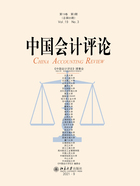
中国会计评论
第19卷第3期
2021年9月
CHINA ACCOUNTING REVIEW
Vol.19 No.3
September,2021
经济政策不确定性与上市公司股权激励
陈胤默 张明 文雯 任莉莉[1]
Economic Policy Uncertainty and Listed Companies' Equity-based Incentives
YINMO CHEN MING ZHANG WEN WEN LILI REN
Abstract The impact of macro-economic policy uncertainty on the decisions of micro companies has drawn much attention in academia. Using Chinese A-share listed companies' data from2006 to 2017, this study investigates the effect of economic policy uncertainty on equity-based incentives of listed companies.This study finds that the possibility companies implement equity-based incentives and the intensity of equity-based incentives implementation both increase with the raise of economic policy uncertainty. Further study reveals that due to the existence of the agency problem of corporate risk-taking, the increase of economic policy uncertainty increases listed companies' operational risk exposure, thus the impact of economic policy uncertainty on listed companies' equity-based incentives are more pronounced in firms with serious agency problems. In addition, when the economic policy uncertainty increases, firms are more likely to adopt shorter period equity-based incentives and use restricted stock option incentives. Our result is robust after employing the propensity score matching approach, controlling potential endogenous problem and using alternative measures. This study extends the literature on the economic consequence of economic policy uncertainty and determinants of equity-based incentives. This study also has policy implications to guide companies to deal with the shock of uncertainty.
Key words Economic Policy Uncertainty;Equity-based Incentives;Agency Problem